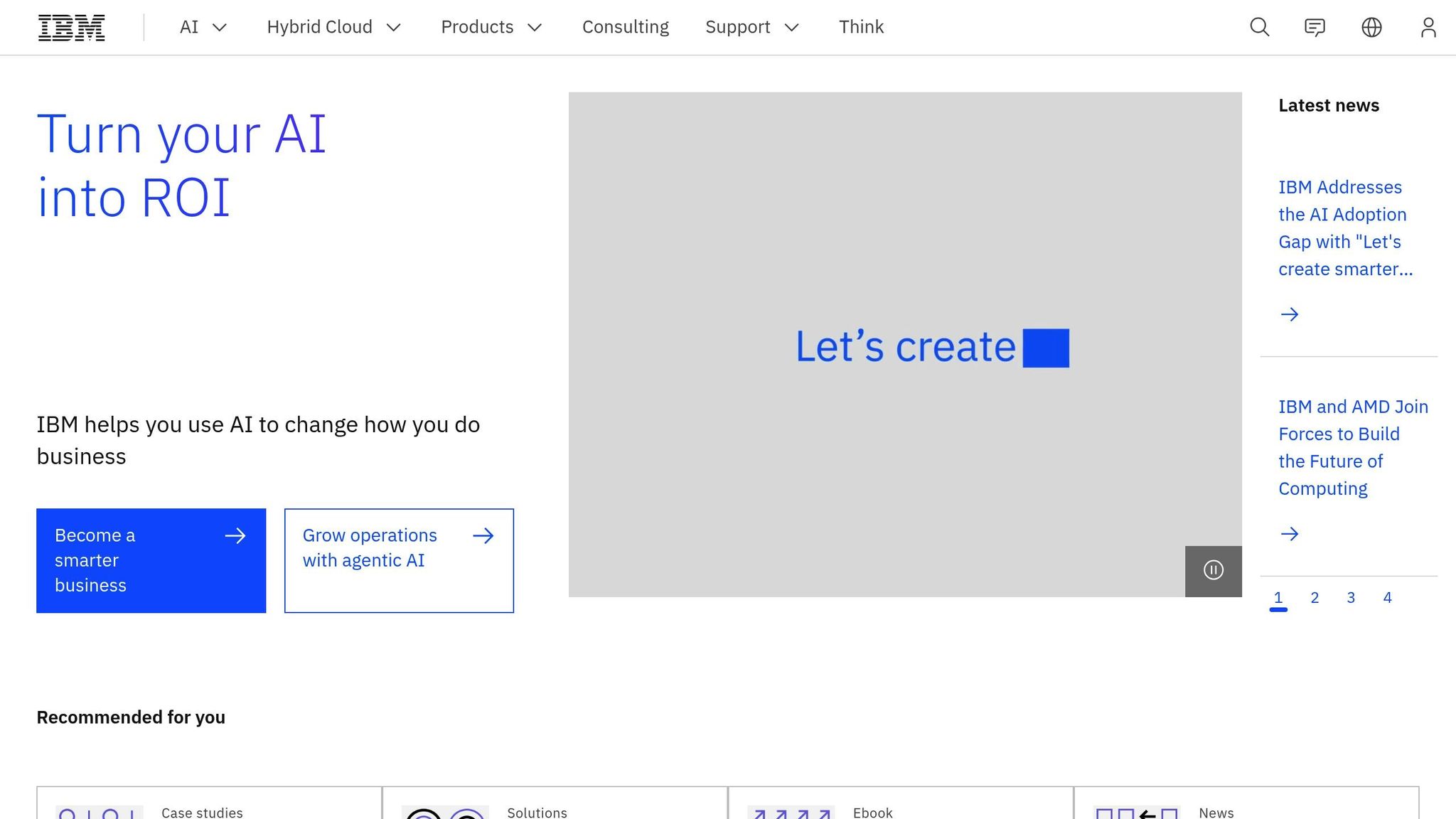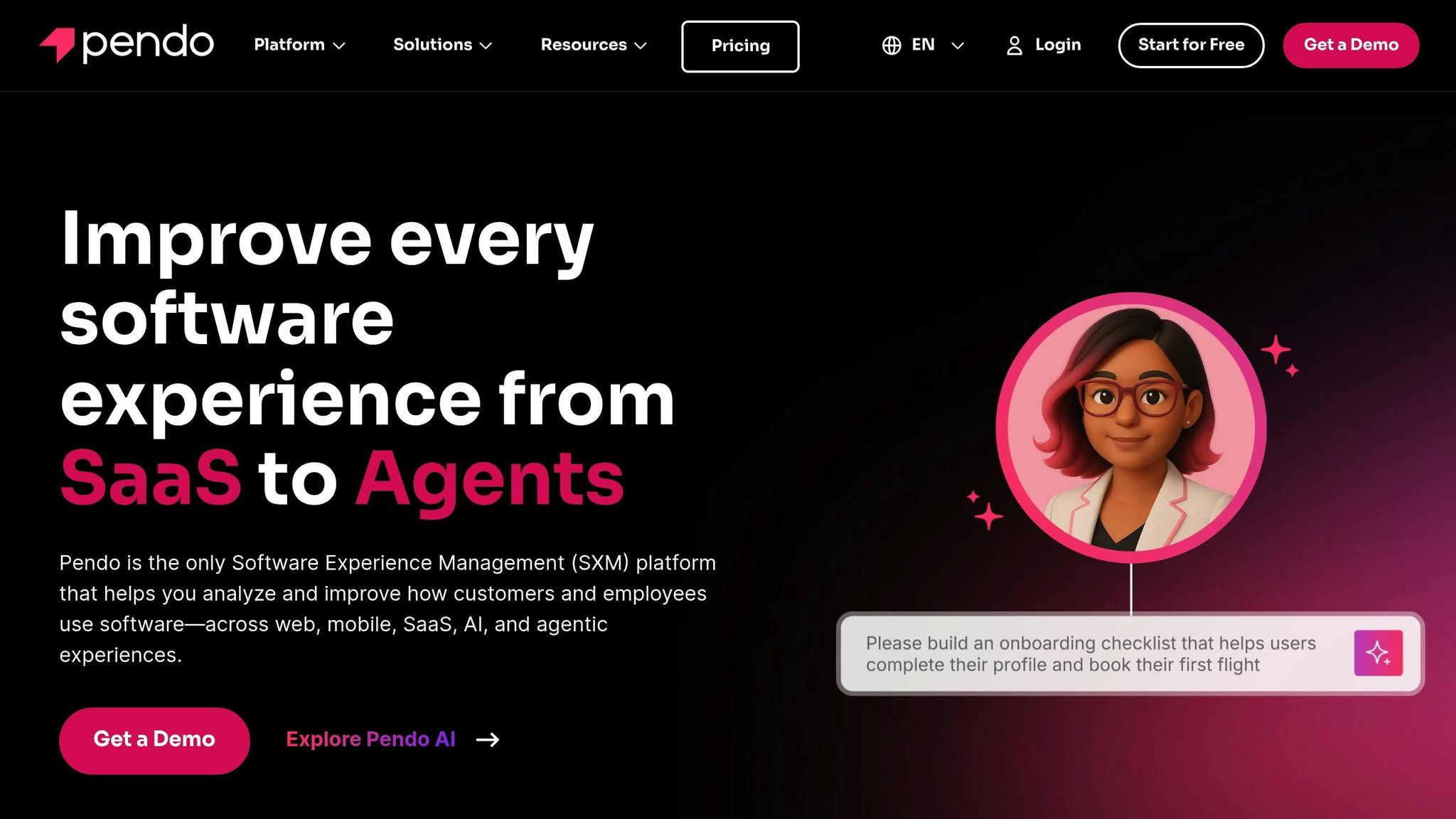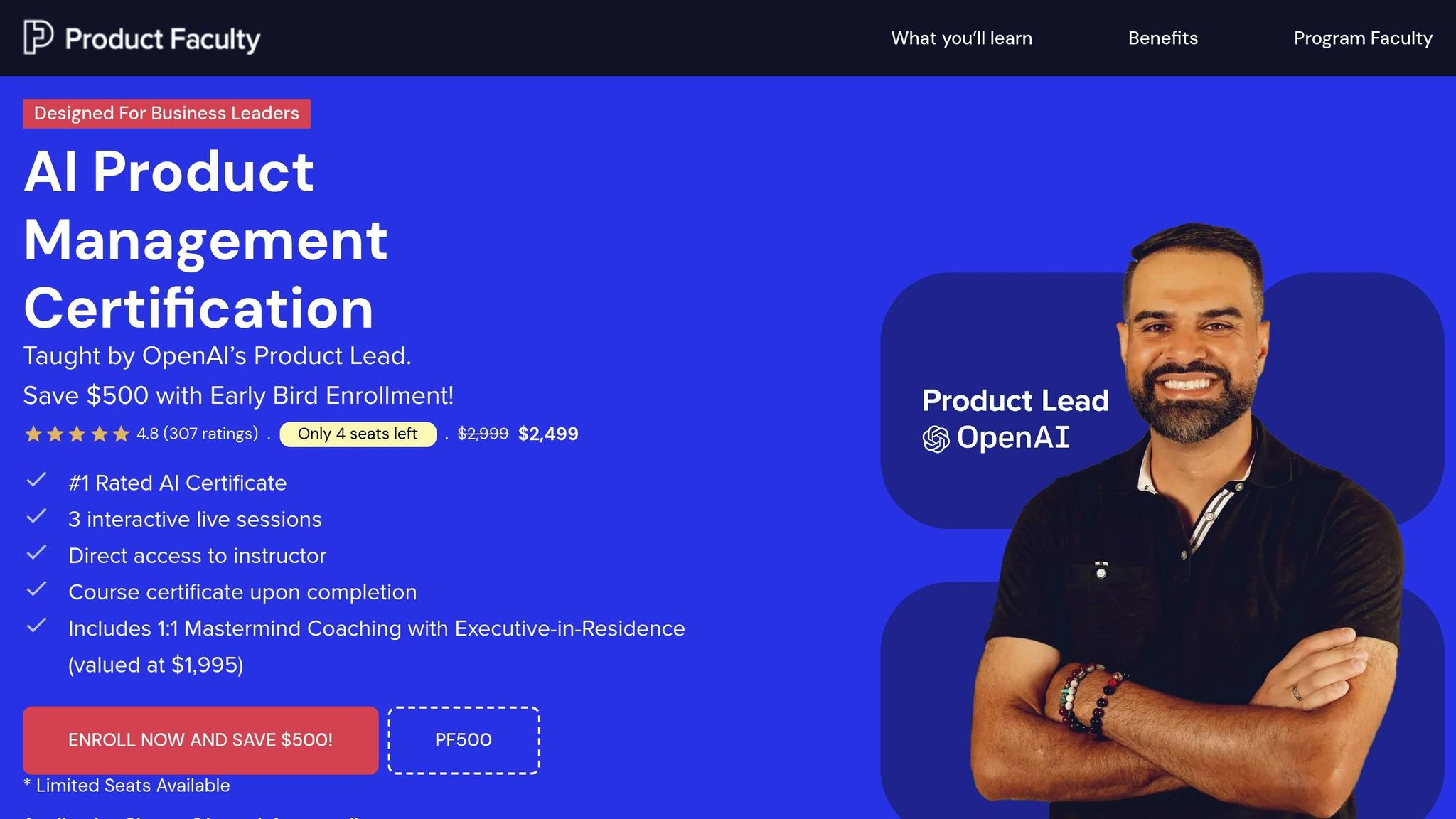Best AI Courses for Product Managers in 2025
Explore top AI courses designed for product managers in 2025 to enhance your skills and stay competitive in a rapidly evolving tech landscape.

Artificial intelligence is reshaping product management, making data-driven decisions and AI-powered tools essential for professionals in the field. If you're a product manager looking to integrate AI into your workflow, these courses can help you gain the skills needed to stay competitive:
- Upskillist: AI for Product Managers: Flexible, self-paced learning with unlimited access to materials. Subscription-based pricing.
- IBM AI Product Manager Professional Certificate: Focuses on AI strategies and hands-on projects. Costs $49/month.
- Duke University AI Product Management Specialization: University-backed program emphasizing AI integration. Costs $49/month.
- Pendo AI for Product Management Course: Self-paced, practical course available for free (limited time).
- Product Faculty AI Product Management Certificate: Intensive live classes with mentorship, priced at $2,995.
Each course offers unique benefits, from hands-on projects to recognized certifications, to help you lead AI-driven initiatives and enhance product strategies.
The COMPLETE AI Product Manager Roadmap [2025]
How to Choose the Right AI Course for Product Managers
Picking the right AI course can be a game-changer for your career, especially as a product manager navigating the rapidly evolving tech landscape. With so many options out there, it's important to approach this decision thoughtfully. Here are some key factors to consider when selecting a course that aligns with your goals and delivers real value.
Focus on Relevant Content
When evaluating courses, prioritize those with content tailored to practical applications rather than deep technical theory. As a product manager, you don’t need to master coding algorithms or dive into complex mathematical proofs. Instead, look for programs that teach you how to leverage AI tools, interpret data-driven insights, and make informed decisions about integrating AI features into your products. The right course should equip you with skills to navigate AI analytics, segmentation, and implementation strategies effectively.
Emphasis on Hands-On Learning
Theoretical knowledge is helpful, but it’s the practical, hands-on experience that truly sets a course apart. Seek out programs that incorporate real-world case studies, simulations, and projects. These elements help you apply what you’ve learned to scenarios like customer data analysis, feature development, and vendor assessment. Avoid courses that rely solely on lectures and quizzes - they won’t fully prepare you for the challenges of using AI in real-world product management.
Instructor Expertise Matters
The quality of the instructor can make or break a course. Look for instructors with direct experience managing AI-driven products or leading AI transformations. These professionals bring invaluable insights into common challenges, vendor selection, and stakeholder management. Their real-world expertise can provide lessons you won’t find in any textbook, giving you a practical edge.
Certification and Industry Recognition
A course’s certification can add significant value to your resume, but not all certifications carry the same weight. Choose programs backed by reputable organizations in the AI space, and check if their certifications are recognized on platforms like LinkedIn. A well-regarded certification can enhance your professional credibility and open doors in the industry.
Flexibility, Time, and Cost
Your personal schedule and resources are important considerations. Flexible or self-paced courses are ideal for balancing learning with work commitments. Be realistic about the time investment - some courses promise quick results but lack depth, while others may require months of study that might not fit into your schedule. Additionally, weigh the course fees against the potential career benefits, and explore whether your employer’s development budget can help cover costs.
Community and Networking Opportunities
A course’s value often extends beyond its curriculum. Look for programs that offer forums, collaborative projects, or access to alumni networks. Connecting with fellow product managers tackling similar AI challenges can lead to valuable insights and opportunities, making the learning experience even richer.
Up-to-Date Content
AI is a fast-moving field, so it’s essential to choose a course that stays current. Look for programs that regularly update their materials or provide ongoing access to new content as AI trends evolve. Staying ahead of the curve will ensure that your skills remain relevant.
Lastly, take the time to define your learning goals. Whether you’re focused on vendor evaluation, feature design, or strategic leadership, having clear objectives will help you zero in on the course that best meets your needs.
1. Upskillist: AI for Product Managers

Upskillist's AI for Product Managers course is specifically designed with the busy schedules of product managers in mind. Its structure ensures that learning fits seamlessly into your day.
Flexibility and Accessibility
One of the standout features of this course is its on-demand flexibility. Whether you prefer joining live sessions or learning at your own pace, the choice is yours. You can pause and pick up where you left off whenever it suits you. With a monthly subscription, you'll also gain unlimited access to course materials, making it easy to tailor your learning experience to your schedule.
2. IBM AI Product Manager Professional Certificate

The IBM AI Product Manager Professional Certificate combines the essentials of product management with practical AI expertise. It’s designed to connect theoretical knowledge with hands-on skills, preparing you for the dynamic world of AI-driven products.
Relevance to Product Management
This program builds on core product management principles but takes it a step further by focusing on strategies specific to AI. It addresses the unique challenges of incorporating AI into products and equips you to lead AI initiatives from inception to launch. You’ll also gain skills to integrate generative AI tools, like ChatGPT and OpenAI, into your product strategy. The curriculum emphasizes practical applications, including AI-driven decision-making and prompt engineering techniques.
Hands-On Learning
The program is packed with interactive, real-world activities. You’ll create a product concept, define its vision, and draft a project charter. From there, you’ll develop detailed checklists for every stage of product development - qualification, launch, delivery, and even retirement. In addition, you’ll work on projects like generating text, images, and code using generative AI tools, experimenting with prompt engineering, and building prediction models (e.g., forecasting used car prices). The final project challenges you to apply everything you’ve learned to design a fully AI-powered product.
Certification and Career Impact
Earning this certificate signals to employers that you have both strategic product management expertise and a strong grasp of AI technologies. Through case studies and interactive projects, the program mirrors real-world challenges, giving you the confidence to apply AI concepts to critical product decisions. This hands-on approach ensures you’re not just learning theory but are prepared to navigate the complexities of AI in professional settings. Up next, see how this certificate measures up against other leading programs.
3. Duke University AI Product Management Specialization

Duke University offers a specialized program designed to help product managers seamlessly incorporate AI into their strategies. This specialization focuses on teaching essential concepts and practical applications, enabling professionals to identify how AI can enhance product strategies and uncover opportunities for improvement in product offerings.
The program dives into current AI trends, explores emerging technologies, and tackles the challenges of integrating AI into business strategies. This approach equips participants with the tools needed for effective decision-making in a rapidly evolving landscape.
Upon completion, participants receive a certification from Duke University, which can enhance their credentials in the competitive field of product management. The course combines engaging lectures with hands-on assignments, providing a real-world perspective on addressing AI-related challenges.
4. Pendo AI for Product Management Course

The Pendo AI for Product Management Course provides a straightforward way for product managers to understand how AI can be applied in their day-to-day roles. This online, self-paced program features six modules and two hours of instructor-led video lessons.
Relevance to Product Management
This course is designed with product managers in mind, aligning AI concepts with the priorities of the profession. It explores how AI can be integrated across the entire product development process, from informing decisions to identifying new market opportunities. Key areas covered include AI-powered data analysis, frameworks for experimentation, and strategies for effective communication - skills that are increasingly critical in the field.
Flexibility and Accessibility
The self-paced structure makes it easy for participants to fit the course into their schedules, which is especially valuable for busy professionals juggling multiple responsibilities. Even better, Pendo offers the course for free, though it typically costs $149.
Practicality and Hands-on Learning
This course focuses on practical applications rather than technical skills like coding. It provides actionable use cases and strategic insights that can be immediately applied to improve workflows and decision-making. With real-world examples and guidance, the course ensures participants walk away with tools to make an immediate impact in their product management roles.
5. Product Faculty AI Product Management Certificate Course

Wrapping up the list is the Product Faculty's AI Product Management Certificate Course, proudly recognized as the "#1 Rated AI Certificate". This program equips product managers with the skills to thrive in the ever-changing AI landscape, offering both an AI Product Management Certification and a Certificate of Completion upon finishing the course.
Course Comparison Table
Here's a quick overview of the key details for each course:
| Course | Duration | Format | Price (USD) | Certification | Key Benefits |
|---|---|---|---|---|---|
| Upskillist: AI for Product Managers | Self-paced | Online, interactive | 7-day free trial, then subscription | Globally recognized certificate | AI-powered tools (Compass AI, Pathfinder), lifetime access, personalized learning paths |
| IBM AI Product Manager Professional Certificate | 4-6 months | Self-paced online | $49/month | Professional Certificate | IBM brand reputation, hands-on projects, industry-relevant case studies |
| Duke University AI Product Management Specialization | 3-4 months | Self-paced online | $49/month | Specialization Certificate | University-backed credential, academic rigor, focus on AI strategy |
| Pendo AI for Product Management Course | 6-8 weeks | Self-paced online | $299 one-time | Certificate of Completion | Product analytics integration, practical Pendo platform experience |
| Product Faculty AI Product Management Certificate | 8-12 weeks | Live online classes | $2,995 | AI Product Management Certification + Certificate of Completion | Intensive mentorship, cohort-based learning experience |
Now, let's explore these factors in more detail to help you choose the right course for your goals.
Understanding Course Formats and Your Learning Style
When deciding on a course, think about how you learn best. If you value flexibility, self-paced courses are a great option. They let you work around your schedule, whether that's evenings, weekends, or whenever you find the time. On the other hand, live online classes provide a structured approach with set schedules and interactive sessions, which can help if you thrive with deadlines and group discussions.
Take a moment to consider your current commitments. If your schedule is tight, self-paced options might be more manageable. But if you’re looking for a more guided experience, live classes might align better with your needs.
Price and Value Considerations
The cost structure varies widely across these courses. Subscription-based models like those offered by IBM and Duke allow you to pay as you go, which can be ideal if you complete the course quickly. Fixed-cost options, such as Pendo, provide clarity upfront, while premium programs like Product Faculty come with a higher price tag but include personalized instruction and mentorship.
Certification and Career Advancement
Earning a certificate can boost your professional profile. Whether it’s a university-backed credential, an industry-recognized certification, or a specialized course completion certificate, these achievements demonstrate your skills and commitment to learning. Depending on your career goals, these certifications can help you stand out in a competitive job market.
Conclusion
Artificial intelligence is already reshaping the world of product management, changing the way products are developed, launched, and refined. For product managers looking to stay ahead, diving into AI education today can pave the way to leading tomorrow’s cutting-edge teams.
The courses discussed offer various approaches to mastering AI - whether through hands-on tools, recognized credentials, academic depth, analytics expertise, or personalized mentorship. Each one focuses on the essential skills modern product managers need, blending AI into decision-making for smarter, more efficient outcomes.
With such a wide range of options, there’s something for every product manager, no matter their experience level or career goals. Committing to AI education not only enhances your career prospects but also equips you to create smarter, data-driven solutions.
Find the course that fits your goals and schedule - whether you can dedicate a few minutes each day or prefer more immersive weekend sessions. The right AI course can help you stay ahead in the ever-evolving world of product management.
The future of this field is undeniably AI-powered and data-focused. Take the next step, choose your course, and lead the charge into this exciting new era.
FAQs
What should product managers look for when selecting an AI course?
When choosing an AI course, product managers should focus on programs that cover hands-on AI concepts such as algorithms, neural networks, and natural language processing. Equally important are lessons on data literacy and analytical thinking, as these form the backbone of understanding and applying AI effectively. Courses that highlight responsible AI practices and offer insights into real-world scenarios can provide added value.
It's also crucial to find courses that explore data-driven decision-making, managing the lifecycle of AI models, and leveraging AI tools for product innovation and market analysis. These skills are key to seamlessly incorporating AI into daily workflows and pushing the boundaries of innovation in product management.
How can earning an AI certification benefit my career as a product manager?
Earning an AI certification can give your career as a product manager a serious edge by equipping you with the skills that are highly sought after in today’s tech-focused industries. These certifications showcase your ability to use AI for product development, informed decision-making, and market analysis - all critical areas that help drive success and innovation in business.
Armed with AI expertise, you'll be better equipped to analyze market trends, design smarter products, and streamline operations, making yourself an indispensable part of any team. On top of that, certifications can boost your professional credibility, unlock new career opportunities, and even bump up your earning potential. For context, product managers in the U.S. typically earn between $100,000 and $200,000+ per year, depending on their experience and area of focus.
As the industry keeps evolving, staying current with AI certifications ensures you're ready to face new challenges and stay ahead in the competitive world of product management.
What hands-on learning opportunities should I prioritize in an AI course for product managers?
When selecting an AI course as a product manager, focus on options that provide practical, hands-on learning through real-world projects. These could involve tasks like designing AI-powered features, building prototypes, or using AI tools to address specific product challenges. Gaining this kind of experience equips you with actionable skills that can directly enhance your work.
Also, give preference to courses that emphasize project-based learning tailored to real product management situations. This method not only helps you strengthen your technical knowledge but also sharpens your decision-making abilities, ensuring your skills align with business objectives and market demands.

